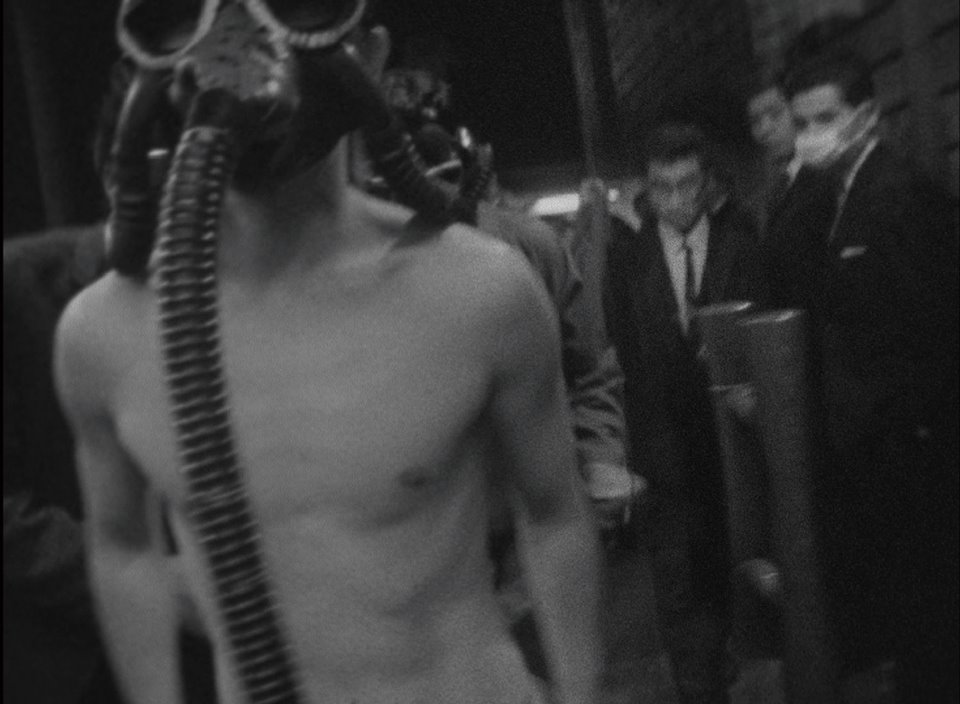
The Art Institute of Chicago, Chicago Stock Exchange Trading Room
Modern Wing Entrance, 158 East Monroe Street
Free, registration required (see saic.edu/cate for details)
A central figure in Japan’s 1960s underground, Rikurō Miyai’s expansive, pop-infused practice spans filmmaking, art criticism, design, and television. In this rare US appearance, he presents two of his best-known works of expanded cinema. In the double-projected Phenomenology of Zeitgeist (1967), Miyai layers ghostlike footage of unauthorized street performances in the Shinjuko district of Tokyo with color filters and lights. In Shadow (1968), he projects two films of his own shadow walking outdoors side-by-side—one positive, one negative—each a reflection of the other. The Chicago-based multi-instrumentalist and media artist Tatsu Aoki (BFA 1983, MFA 1985) joins Miyai for this special appearance, performing with his group Reduction Ensemble, featuring cellist Jamie Kempkers, guitarist Ramy Atassi, percussionist KIOTO, and Edward Wilkerson on woodwind.
Curated with Go Hirasawa and Julian Ross and presented in collaboration with the Mary and Leigh Block Museum of Art and the Art Institute of Chicago in conjunction with the exhibition Provoke: Photography in Japan between Protest and Performance, 1960–75.
1967–2017, Japan/USA, 16mm, video, live performance and music, ca 60 min.
Rikurō Miyai is a filmmaker and critic. He studied film through the Association of Documentary Filmmakers while a student at Waseda University. Influenced by Andy Warhol and Japan’s 1960s “shadow debate,” about the growing indistinguishability between object and its image, Miyai turned toward increasingly complicated expanded cinema and environmental works, playing an important role in the development of Japanese intermedia. In addition to his expanded cinema works, he worked as a model, served as a critic for the journals Eizō Geijutsu and Kikan Firumu, advised on television programs and magazines, designed discotheques and headed Unit Productions, an independent film company set up in his apartment in Shinjuku.
Tatsu Aoki is a leading advocate for the Asian American community, a prolific composer and performer of traditional and experimental music forms, and a filmmaker and educator. He has produced more than 30 experimental films and is one of the most in-demand performers of bass, shamisen, and taiko, having contributed more than 90 recording projects and touring internationally during the last 25 years. In the early 1970s, Aoki was active in Tokyo’s underground arts movement as a member of Gintenkai, an experimental ensemble that combined traditional music and new Western forms. In the same period, he began making small-gauge and experimental films. In 1977, Aoki left Tokyo to study experimental filmmaking at SAIC. In 2001, the Asian American Institute awarded Aoki the Milestone Award for his contribution to Chicago-area arts. In 2010, he received the Japan America Society of Chicago’s Cultural Achievement Award as well as a 3Arts Artist Award. He received the “Living in our Culture” award by the Japanese American Service Committee in 2014 and Jazz Heroes’ Award by National Jazz Journalist Association in 2015. In 2016, his Miyumi Project ensemble was chosen as the official musical presenters for the unveiling of Yoko Ono’s first permanent installation in North America, Sky Landing, in Chicago’s Jackson Park. The group also recorded the album Sky Landing, produced by Yoko Ono. Aoki is Adjunct Professor in the Departments of Film, Video, New Media, and Animation and Art History, Theory, and Criticism at SAIC and a visiting professor at Northwestern University. He is also the founder and artistic director of the Chicago Asian American Jazz Festival and president of San Francisco–based Asian Improv Records (AIR).